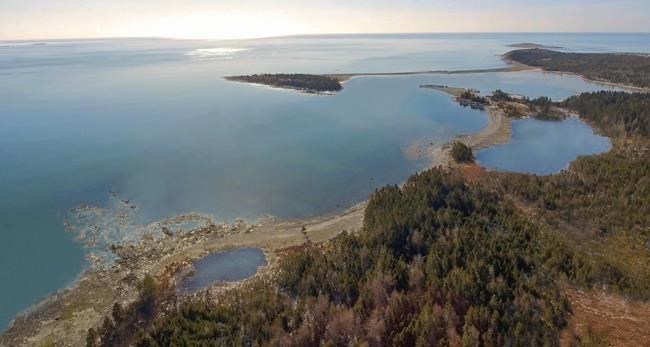HALIFAX — The plan to build North America's first wild refuge for whales retired from marine parks took a big step forward Friday in a remote corner of northeastern Nova Scotia.
The Whale Sanctuary Project officially opened its visitor and operations centre in Sherbrooke, N.S., marking the first time the U.S.-based conservation group has moved from the planning phase to actually building something.
"It's a milestone," Charles Vinick, the project's executive director, said in an interview this week. "This really does show people that we are here, and we'll be cutting the ribbon to show this is in fact our home, here in Nova Scotia."
The new centre has been built in a renovated century home on the main street in Sherbrooke, a former timber and gold-mining town about 200 kilometres northeast of Halifax.
"It's a good opportunity for a new business to come into the municipality," said Greg Wier, the warden of the rural municipality that includes Sherbrooke. "For the most part, everybody is happy that it's coming ... I don't think there's any opposition."
Wier said the public wants to see whales in their natural environment rather than in captivity.
"There's a lot of public outcry for these whales being held in little pens," he said in an interview this week.
The proposed 40-hectare, coastal sanctuary — to be enclosed by large underwater nets — is expected to be built next year south of Port Hilford, N.S., a 20-minute drive southeast of Sherbrooke. It will be as large as 50 Canadian football fields and about 300 times larger than the biggest tank in any marine park.
The refuge could welcome its first whales in early 2023, assuming the project gets the required federal and provincial permits, Vinick said. It is designed to accommodate up to eight beluga whales, which he said can't be returned to the open ocean because of their lack of survival skills.
Despite public support, questions remain about the project, particularly when it comes to rough weather, the accumulation of whale waste and the potential for escapes.
Vinick said the site is well-protected from prevailing winds, an assertion partly based on his witnessing the arrival of two tropical storms in the past two years. As for the buildup of whale feces, he said a hydrodynamic study has shown the bay is regularly flushed by the currents and tides.
He also dismissed the possibility that the imported whales could transmit diseases to the resident whale population.
"The data suggest that those risks are extremely low," Vinnick said. "Generally, pathogens only are transmitted through physical contact, not through water-borne passage." The fact that migrating whales typically remain offshore means there will be limited interaction, he added.
Meanwhile, the non-profit group has started a campaign to raise up to $20 million for the project, which also calls for the construction of a veterinary clinic and interpretation centre near the refuge. Another $2 million would be needed annually for operations.
"We have a number of seven-figure donors who are very committed to this, and we're in discussions with others," said Vinick, who worked for 25 years with renowned undersea filmmaker Jacques Cousteau and his son Jean-Michel. The group is not asking for government funds.
About 200 belugas and 50 orcas are being kept in marine parks and aquariums around the world, though precise figures have been difficult to come by since entrepreneurs in China started building marine parks and importing whales from Russia. The Marineland Park in Niagara Falls, Ont., has about 40 belugas and Canada's lone captive killer whale, Kiska.
Public attitudes toward keeping these highly intelligent and socially complex animals in captivity have changed as researchers have learned more about their lives.
And the 2013 documentary "Blackfish" helped expose the darker side of the marine mammal entertainment industry by focusing on Tilikum, an orca involved in the deaths of three people. Ontario became the first province to ban the buying, selling and breeding of orcas in 2015.
The Vancouver Aquarium no longer keeps whales or dolphins in captivity. And in 2019, the Canadian government passed a law banning whales, dolphins and porpoises from being bred or held in captivity, though the law does not apply to the animals already living at Marineland.
The world's first whale sanctuary opened in southern Iceland in 2019. The Sea Life Trust has two belugas from China — Little Grey and Little White.
This report by The Canadian Press was first published Oct. 29, 2021.
Michael MacDonald, The Canadian Press



